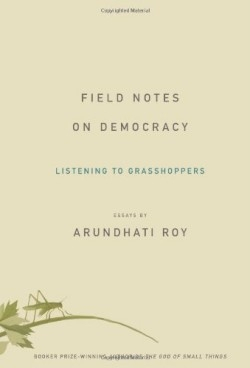Field Notes on Democracy
Listening to Grasshoppers
Democracy. Usually the word brings to mind enthusiastic lines of citizens waiting patiently to vote and social programs designed with the best interests of the public-all of the public-in mind. With biting descriptions, endearing sensitivity, and an acerbic wit, Arundhati Roy shows us another kind of democracy. Government cover-ups, corruption in the high court, genocide, and the slow starvation of many people-these are the products of India’s democracy as told in the eleven essays included in Field Notes On Democracy: Listening to Grasshoppers.
To illustrate the true nature of her country’s government, Roy, author of several non-fiction books and a Booker Prize-winning novel, uses several examples of violence: including the burning alive of fifty-eight Hindu pilgrims on the Sabarmati Express in Godhra and the reprisal attacks on Muslims; the attack on the Indian Parliament in December of 2001 and the subsequent corrupt investigation; and the continued, deadly turmoil in Kashmir. While examining the roles the government, the police, and the media played in these horrific events, Roy focuses on the people who get caught in the web of deceit. Too many suffer rape, death, displacement, and unjust imprisonment at the hands of those who are supposed to support the democratic population.
While she does not hesitate to clearly assign fault when the occasion requires it, she makes the argument that today’s oppressors are tomorrow’s victims. She writes, “Â…it was painful to listen to people who have suffered so much themselves, mock others who suffer, in different ways but no less intensely, under the same oppressor. In that slogan I saw the seeds of how easily victims can become perpetrators.”
When writing about the violence surrounding the Godhra train-burning, she drives this same point into the reader’s consciousness: “The more the two sides try and call attention to their religious differences by slaughtering each other, the less there is to distinguish them from one another… They’re both apostles of the same murderous god, whoever he is.” Roy doesn’t write from any particular side; instead she aligns herself with truth.
It’s hard to read about such violent, hateful events. It would be easier to turn away. But Roy keeps us close to her with language that is as beautiful as the events are ugly. This book fends off useless despair and turns wisely towards a sense of hope and a feeling of possibility. (October) Andi Diehn
Disclosure: This article is not an endorsement, but a review. The publisher of this book provided free copies of the book to have their book reviewed by a professional reviewer. No fee was paid by the publisher for this review. Foreword Reviews only recommends books that we love. Foreword Magazine, Inc. is disclosing this in accordance with the Federal Trade Commission’s 16 CFR, Part 255.

